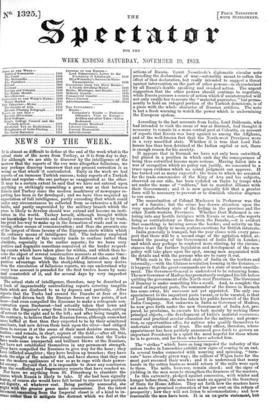NEWS OF THE WEEK.
Iris almost as difficult to define at the end of the week what is the actual state of the news from Turkey, as it is from day to day. For although we are able to discover by the intelligence of the morrow that the reports of the eve were altogether fallacious, we may perhaps discovex tomorrow that our present correction is as wrong as that whiclht contradicted. Early in the week we had reports of an immense Turkish Success; today reports of a Turkish defeat and repulse—the one perhaps as exaggerated as the other. It may to a certain extent be said that we have not entered upon anything so strikingly resembling a great war as that between Russia and Turkey since the modern machinery of newspaper re- porting has been so far developed ; and we have thus acquired an expectation of full intelligence, partly exceeding that which could -under any circumstances be collected from so extensive a field of battle, and partly unprovided by the military branch which the press is likely to 'develop should war extend and become an insti- tution in the world. Turkey herself, although brought within our knowledge by tourists and closely connected with us by trade, has great lee-way to make up in the formation of roads and in con- triving other means of communication ; and thus she presents one of the largest of those lacunae of the European circle within which the ordinary means of intelligence fail. The industry employed round the borders of this vacuity tends to confuse rather than elucidate, especially in the earlier reports ; for we have very positive and dogmatic assertions conceived at the border respect- ing events which have taken place far within, and which thus be- come the obieet of several constructive accounts at the same time : and if we add to these things the bias of different sides, and the positive advantage which the stockjobbing interest may derive from the circulation of fallacious reports, we can understand why every true amount is preceded for the first twelve hours by some mad counterfeit of it, and for several days by very imperfect imitations.
The actual state of intelligence, therefore, may be described as a husk of impenetrably contradicting reports covering tangible facts which are disclosed to us by degrees and partially. After reports that the Turks had crossed the Danube at four or five Places—had driven back the Russian forces at two points, if not more—had even compelled the Russians to make a retrograde con- centration upon Bucharest—had actually taken that town and driven the Emperor's army from it towards Transylvania, cutting off retreat to the right and to the left ; and after being taught, on the contrary, to believe that the Russian forces, although somewhat more baffled at first than they expected to be by their scimitered assailants, had now driven them back upon the river—had obliged them to recroas it at the scene of their most decisive success, 01- tenitza—and remain, in sh9, captors of the field ;—after all this, We are brought up to the provisional conclusion that the Turks have made some unexpected and brilliant blows at the Russians, but have not established themselves in any permanent strength. They have compelled the Russians to give way for the hour ; they have inflicted slaughter; they have broken up trenches ; they have Made the edge of the scimitar' felt, and have shown that they can Use the modern appliances of war so as to cope with their power- ful enemy. Beyond that, it is impossible to .draw any conclusion from the conflicting and fragmentary reports that have reached us. Nor have we anything from St. Petersburg to elucidate the 0,aurse which Russia is likely to take. If she had been signally be8ren, of course she would have felt bound to recover her position and dignity, at -whatever cost. Being partially successful, she Slight with the greater grace make concessions. But the latest bean:Lent emanating from the Imperial closet is of a kind to an- -'ease rather than to mitigate the distrust which we feel at the
actions of Russia. Count Nesselrode's diplomatic circular note preceding the declaration of war—ostensibly meant to soften the effect of that declaration, but really intended to suggest a threat against intervention on the part of other powers—is characterized by all Russia's double speaking and crooked action. The urgent suggestion that the other powers should continue to negotiate, while Russia pursues a course of action which if uninterrupted will not only enable her to secure the "material guarantee, " but perma- nently to hold an integral portion of the Turkish dominions, is of a piece with the whole character of Russian artifices. The note is but a fresh warning to watch the power which is undermining the European system.


































